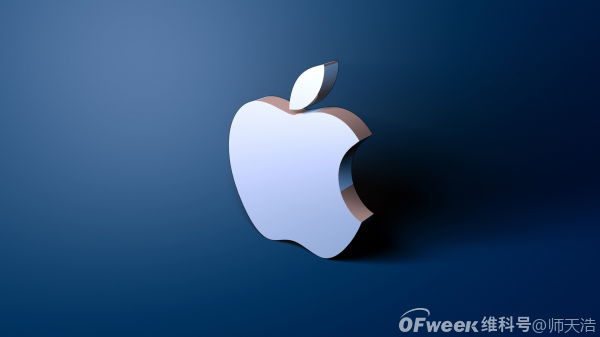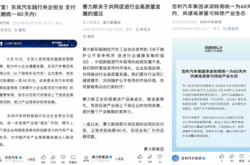To Make You Buy an iPhone, Apple Unveils a New AI "Route"
![]() 06/13 2024
06/13 2024
![]() 630
630

Whether you admit it or not, Apple, the first company in the world with a market capitalization exceeding $3 trillion, has always been a company that relies primarily on hardware for revenue since its inception. In contrast, Apple's globally top-tier software capabilities can be seen as a differentiated route to selling hardware.
In the past decade or so, hardware revenue accounted for about 70-80% of Apple's income, with the iPhone accounting for half of that.
Since Tim Cook took the helm at Apple, the company has seen rapid growth over the past decade, but its strategy of seeking new hardware beyond the iPhone has often faltered. This includes products like Apple TV, Apple Car, Vision Pro, some of which were aborted, while others did not develop smoothly.
Recently, at WWDC24, Apple announced Apple Intelligence, introducing a series of AI features for devices like the iPhone and Mac. As a result of this positive news, Apple's market capitalization once again surpassed $3 trillion.
It can be said that in order to make people "fall in love" with the iPhone again, Apple may have decided to delve deeper into the concept of AI hardware products.
Apple's New AI "Route"
At WWDC 2024, Apple announced its AI service, but this AI is fundamentally different from the AI we commonly refer to. It is called "Apple Intelligence."
It is based on Apple's built-in large language model, executing users' voice or text commands by understanding natural language.
Compared to the "broad adaptability" pursued by more well-known general and industry-specific large models, Apple's AI service, like its past software services, still runs independently within Apple's hardware products.
According to current information from Apple, even within Apple's hardware products, its AI only supports the latest products and those to be launched in the future. Currently, only the A17 Pro or M-series chips can utilize these features. In other words, only the iPhone 15 Pro, iPhone 15 Pro Max, and iPad and Mac models equipped with M1 and above can use Apple Intelligence.
Thinking ahead to September, it seems likely that the iPhone 16 series will fully support Apple Intelligence. The seemingly hasty launch of the AI service is undoubtedly aimed at boosting iPhone sales.
Multiple data shows that in markets like the United States, China, and Europe, the iPhone, which is Apple's main revenue driver, is in a state of overall sluggishness. The highlights presented by Apple Intelligence are bound to invigorate Apple fans, potentially leading to a sales rebound for the iPad and Mac as well.
I believe that the enhancement of Apple Intelligence's appeal to the iPhone mainly lies in the following aspects:
1. Built-in ChatGPT: While Apple's released "AI" is centered around its own capabilities, from my perspective, its support for ChatGPT is even more appealing. After the collaboration, Siri can directly utilize ChatGPT's capabilities. For example, if you want to know which plant is suitable for your yard, you can take a photo, and Siri can provide an answer using ChatGPT.
Before using this service, users will be asked if they want to use ChatGPT. Moreover, Apple users can access GPT-4o for free without creating an account, while ChatGPT subscribers can connect their accounts and directly access paid features within the Apple system. As we all know, ChatGPT is not available in China, and Wenxin Yiyan serves as the main force for domestic Apple users. According to Apple, it will not exclusively bind to any specific large model. Craig Federighi said that Apple will introduce other large models in the future.
We know that large models have already accumulated billions of users. Users have become accustomed to GPT-4o, Wenxin Yiyan, and other super players that started early, invested heavily, and continuously iterate, far surpassing their competitors in terms of experience. Apple's choice to collaborate rather than rebuild its own system is similar to its approach in the search engine field (large models and search have relatively close ties), undoubtedly the best choice for Apple fans' user experience.
A Smarter Siri: In the past, Siri could only execute simple commands, leading some users to even refer to it as "artificial stupidity." However, Siri in the era of Apple Intelligence will support multi-round dialogues in natural language, understand context, and also support text input.
Siri, as a voice assistant, has been around for over a decade, only able to handle simple functions like "setting a timer" or "creating a reminder." Moreover, many questions would simply push a bunch of search links to the user, an experience far inferior to many large models. Users will likely need to upgrade their systems or purchase new Apple products to truly experience the disruptive changes in the new Siri.
Information Generation Capabilities: This includes refining web information in Safari, categorizing and summarizing emails, generating email replies or text polishing. Additionally, Apple AI will summarize key information pushed by mobile apps for priority notifications.
Due to privacy considerations, the iPhone has not supported call recording in the past, but it will support this feature in the future and provide intelligent summaries. Guided by Apple's information security philosophy, the other party will receive a notification when the user records a call.
Enhanced Image Capabilities: Users can simply input a description, and the Apple system will utilize the existing photo library to create a "movie with a unique narrative arc." Alternatively, users can directly tell the phone what kind of image they are looking for, and the system will find the corresponding image from the vast photo library. Users can also eliminate unwanted elements in the image with a single click.
The new system can also generate emojis and images. When users cannot find a suitable emoji to express their intended meaning, they can freely create their own emojis using natural language.
When sending messages to friends, users can generate images in different styles using their photos, making the conversation more interesting. Currently, it supports three styles: sketch, illustration, and animation.
When you see these revolutionary changes in the software ecosystem, don't you feel excited and want to "pre-order" the iPhone 16 series? Alternatively, you can purchase the iPhone 15 Pro, iPhone 15 Pro Max, and iPad and Mac models equipped with M1 and above to experience Apple's new AI ecosystem based on its own hardware products in advance.
Can It Usher in a Second Spring for the iPhone?
As a user who has always used both Android and iOS devices, I do not have a clear "camp" mindset. However, from a real-world usage perspective, the software service experience provided by Apple products far surpasses Android and the HarmonyOS ecosystem I am currently using.
However, it cannot be denied that the Cook era has primarily focused on giving the iPhone and other Apple products competitive advantages at the hardware level, while the software aspect has remained largely based on the foundation left by Steve Jobs. The larger and larger iPhone screens have been the key to capturing Apple fans' attention after Jobs.
Although there were innovations like the notch design of the iPhone X and the Dynamic Island of the iPhone 14, Apple is no longer considered "cool," and the iPhone has gradually transformed from a cult following to being merely the best high-end smartphone available.
This decline in popularity from a broader perspective is also reflected in sales figures.
Taking the domestic market as an example, Counterpoint released a set of the latest market reports, showing that in the first quarter of 2024, Apple's iPhone sales in China experienced a significant slump, with a year-on-year decline of up to 19.1%. This made it the largest drop among the top six brands in the Chinese market during that quarter, and it also marked Apple's worst performance in the Chinese mainland market since 2020.
To address sluggish sales, during this year's 618 shopping festival, both Apple's JD.com flagship store and Tmall official store launched unprecedented price reductions, with the iPhone 15 series seeing a maximum price drop of up to 2,350 yuan.
A similar situation is unfolding in Europe. On June 7, market research firm Canalys released data showing that in the first quarter of this year, Apple's iPhone shipments in Europe reached 7.3 million units, a year-on-year decline of 17%. It was the only brand among the top five vendors to see a shipment decline; it also ranked second in the market with a 22% share, down 5 percentage points year-on-year, making it the only brand among the top five to see a share decline.
This feedback from the Chinese and US markets echoes the fact that iPhone's new activation share in the US market in the first quarter of this year also dropped to its lowest level in six years, indicating global users' indifference towards the iPhone.
Before finding a new hardware successor to the iPhone, Apple still needs to give the iPhone a second spring, which is the only way to continue driving up Apple's stock price.
Apple Intelligence Needs to Meet Users' Intelligence Requirements: There are many reviews surrounding Apple AI, and the intelligent changes presented by Apple Intelligence are evident. However, everything still needs to be thoroughly tested by users in daily use, and only by giving Apple Intelligence high praise can it truly restore the impression that the iPhone is cool and technologically advanced.
As smartphones evolve, software operation remains hierarchical, requiring users to open the home page, secondary page, and tertiary page in sequence. If the iPhone achieves a high level of intelligence, users can use voice commands to directly open a specific function within an app (for example, directly commanding Siri to open Alipay's payment code or scanning a WeChat friend's QR code).
Moreover, users can directly utilize large model capabilities during text input in messages, WeChat, notes, etc., reducing creation time. Or, more powerful AI cameras, AI emojis, and other image capabilities will revolutionize the ease of operation of smartphones, directly widening the gap between the iPhone and other smartphones.
Facing Apple's declining appeal, IDC Research Director Nabila Popal previously stated, "If Apple wants to reverse this trend and accelerate growth, developing a clear AI strategy is crucial."
Popal also pointed out that the challenge for Apple lies in "convincing consumers why they need these new AI features and, more importantly, why these features need to be implemented on their devices to encourage them to upgrade." The answers to these questions will require real feedback from users in practical usage.
Whether the Apple Intelligence Model Will Be Copied by "Competitors": If one had to say how the iPhone has declined, perhaps it started when many Android phones stopped "copying" Apple. When the iPhone X had its notch design, many players actively copied this design. However, when the Dynamic Island was introduced, the enthusiasm for "copying" the iPhone decreased significantly, and to this day, the Dynamic Island has failed to become an absolute leading design trend. This superficial change, interpreted from a broader perspective, is a signal that the iPhone has lost its charm.
According to market research firm Counterpoint's prediction, by 2027, "AI phones" will account for 43% of global smartphone shipments, with over 1 billion users utilizing these devices. For Apple, entering the "AI" era is not too late. However, currently, smartphone brands like Samsung, Huawei, Xiaomi, OPPO, and vivo are also launching or about to launch their own AI-powered smartphones.
Compared to these earlier entrants, Apple's AI has a unique aspect, which is its emphasis on information security protection. Apple has always been loved and praised by consumers for its strict privacy protection, which is far superior to both Google and HarmonyOS.
Most of Apple AI's functions are processed locally on the device, but for some applications with heavy loads, data processing needs to be done in the cloud. Cloud computing runs on Apple Silicon servers, which have payment-level security protection.
Apple stated that the cloud servers do not store any user data and use strict encryption methods to protect data security.
Looking ahead, will Apple's AI logic be copied by competitors? Will Apple AI's emphasis on privacy protection be adopted as a standard by competitors? The answers to these questions will determine whether the iPhone's second spring has arrived.
Apple, which has regained a market capitalization of $3 trillion, is at the third critical crossroads in its history (the PC era, the smartphone era, and the AI era). Whether it can deliver a perfect answer in the AI era will determine Apple's rise and fall in the next decade.
Reference Articles:
Digital Frontline - "Apple AI: Not Much Surprise, But It Sets an Example for Android Phones"
LatePost - "Apple's Large Model Sprint: No New AI Products, Only New Features"








